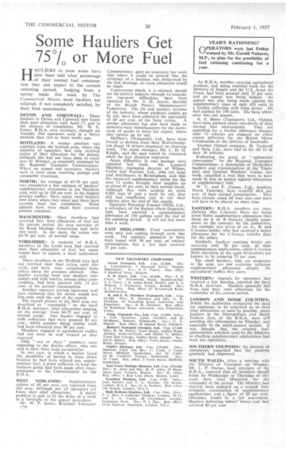Some Hauliers Get
Page 58

If you've noticed an error in this article please click here to report it so we can fix it.
7570 or More Fuel HAUL1ERS in most areas have now been told what percentage of their normal fuel consumption they can expect in the current rationing period. Judging from a survey made this week by The Commercial Motor, most hauliers are relieved, if not completely satisfied, by their final assessments.
DEVON AND CORNWALL: Many hauliers in Devon and Cornwall now know their total allocation until April 17, and in the absence of complaints, Mr. W. E. Foster, R.H.A. area secretary, thought on Tuesday that operators were in a better position than two or three weeks ago.
SCOTLAND: A similar position was reported from the Scottish area, where the majority of operators had now received notice of their allocation for the period, although this had not been done in every case by Monday. as originally promised by the Regional Transport Commissioner. Where an appeal was necessary, hauliers were in most cases receiving prompt and reasonable treatment.
NORTH: An average of 65-70 per cent. was considered a fair estimate of hauliers' supplementary allocations in the Northern area, with up to 100 per cent, in the highest priority traffics, Here, again, most hauliers now know where they stand and there have recently been few complaints. What appeals have been made have received prompt attention, MANCHESTER: Most members had received their final allocation of fuel for the current period, the area secretary of the Road Haulage Association said early this week, in the main, the ration was 65-75 per cent, of normal usage.
YORKSHIRE: A majority of R.H.A. members in the Leeds area had received [heir final allocation of fuel, but many would have to appeal, a local spokesman said.
Many members in the Sheffield area had not received their final ration early this week, and there were complaints from others about the amounts allowed. One haulier carrying food and medical containers and milk bottles, among other commodities, had been granted only 37 per cent, of his normal consumption.
Another operator serving open-cast coal sites eetimated that his ration would last him only until the end of the month.
The overall picture in the Hull area was described as " reasonable" by the local R.H.A. secretary, final allocations ranging, on the average, from 60-75 per cent. of normal usage. One haulier engaged in milk collection had been granted 80 Per cent., whilst another doing similar work had been allocated over 90 per cent.
Members engaged in agricultural traffics had not been so well treated as they expected.
Only " two or three" members were appealing to the district officer, who was said to have been most co-operative. in one case, in which a haulier faced the possibility of having to close down because he had been refused any supplementary fuel, a grant sufficient to keep the business going had been made after representations to the Commissioner by the R.11.A.
WEST MIDLANDS: Supplementary rations of 60 per cent, are reported from this area, although not all operators yet
know their total allocations. A major problem is said to be the delay of a week to a fortnight in the appeal procedure. Mr W. P. James, Regional Transport Commissioner, gave an assurance last week that where it could he proved that the existence of a business was threatened by the fuel shortage, an extra allocation would be made.
Concessions which, it is claimed, should see the pottery industry through its immediate transport difficulties, have been obtained by Mr. S. H. Jerrett, director of the British Pottery Manufacturers' Federation. The tile and sanitary sections of the industry, whose products cannot go by rail, have been allocated the equivalent
of 60 per cent, of the basic ration. A similar allowance has also been made to domestic-ware manufacturers for the movement of goods to ports for export, where they cannot go by rail.
McPhee's (Newcastle), Ltd. have been forced to dismiss from their Wolverhampton depot 14 drivers employed on shunting work. The depot manager,. Mr. C. H. D. Knight, said the men would be reinstated when the fuel situation improved.
Acute difficulties in coal haulage were reported last week. Mr. Leonard Maybury, managing director of Wilson, Carter and Pearson, Ltd., who are large coal distributors in Birmingham, said that the increased supplementary ration for the next 12 weeks brought their supplies up to about 45 per cent, of their normal needs. Although they were sending an extra 4,000 tons of coal a week by rail, they still had insufficient fuel to run their vehicles after the end of this month.
Easiclene Porcelain Enamel (1938), Ltd., a subsidiary of the Rubery Owen Organization, have received a supplementary allowance of 150 gallons until the end of the rationing period. It will not last more than a week.
EAST MIDLANDS: Final assessments were only just coming through early this week. The majority appeared to have been issued with 50 per cent, of normal consumption, but a few had received 75 per cent.




































































































